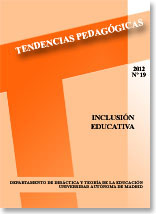Keywords:
Communication, study of case, educational institutions, strengths and weaknesses of the organizational communication.Copyright (c) 2015 Tendencias Pedagógicas

This work is licensed under a Creative Commons Attribution-NonCommercial 4.0 International License.
Abstract
The communication in the educational centers constitutes an essential element for his correct functioning. The difficulties of communication detected in an educational institution made show this problem and submit it to study. At the investigation that we sense beforehand one was employed with educational centers of an Argentine institution. A bibliographical review was in use with the communicative theories and one worked with the methodology of the study of case. The instruments were the observation, the interview in depth, the documentary analysis and the questionnaire. The both qualitative and quantitative results were categorized and interpreted. There are gathered the strengths and communicative weaknesses of the educational studied institution.Downloads
References
BAYLON, C. y MIGNOT, X. (1996), La Comunicación. Madrid: Cátedra.
BERTALANFFY, L. von (1976), Teoría general de los sistema. Fundamentos, desarrollo, aplicaciones.México: FCE.
CANTÓN MAYO, I. (2000), Herramientas para implantar la calidad en la educación, en: CANTON MAYO, I. (Coor.) – Evaluación, cambio y calidad en las organizaciones educativas. Buenos Aires: Fundec.
CANTÓN MAYO, I. (Coord.) (2009): Narraciones de la escuela. Barcelona: Davinci.
CANTÓN MAYO, I. (Coord.) (2010): Narraciones de Maestros. Barcelona: Davinci.
CARDOSO VARGAS, A. (1999): “La comunicación educativa no verbal: apuntes para un proyecto de investigación”. Razón y Palabra, Revista Digital. Consulta Diciembre 1999.
CEA D’ANCONA, M. (1996), Metodología Cuantitativa. Madrid: Síntesis.
DEL POZO LITE, M. (1997), Cultura empresarial y comunicación interna. Su influencia en la gestión estratégica. Madrid: Fragua.
GARCÍA JIMÉNEZ, J. (1998), La comunicación interna. Madrid: Díaz de Santos S.A.
GONZÁLES MORALES, L. (1999): “Metodología para la construcción de un modelo de comunicación educativa en el aula”, Razón Y Palabra, Revista Electrónica. Consulta Enero de 2010.
LAZARSFELD, P. Y MERTON, R. (1977), Comunicación de masas, gusto popular y acción social organizada. En: MURARO, H. (Comp), La comunicación de masas. Buenos Aires: Centro Editor.
LOSADA VÁZQUEZ, A. (1998), La comunicación institucional en la gestión del cambio – El modelo universitario. Salamanca: Caja Duero.
PICÓN MEDINA, G. (2001) “El comportamiento y el cambio en las organizaciones educativas: vías para una investigación educacional crítica”. Investigación y Postgrado, v.16, n°2, Caracas
PIÑUEL RAIGADA, J. (1997), Teoría de la comunicación y gestión de las organizaciones. Madrid: Síntesis.
SALDRIGAS MEDINA, H. (2004): “Una mirada a la comunicación organizacional desde una institución educativa cubana”. Soluciones Integrales en comunicación, Cuba.
SHANNON, C. y otros (1981), Teoría matemática de la comunicación. Madrid: Forja.
SUÁREZ, O. Y OTROS (2003): “La comunicación informal en la organización, otra mirada desde la intersubjetividad”. Razón y Palabra, Revista electrónica n° 23. Consulta Noviembre de 2009.
WATZLAWICK, P., HELMICK BEAVIN, J. y, JACKSON, D. (1983), Teoría de la Comunicación Humana. Barcelona: Herder.
WIENER, N. (1969), Cibernética y sociedad. Buenos Aires: Sudamericana.
WINKIN, Y. (1981), La nueva comunicación. Buenos Aires: Cairos.
